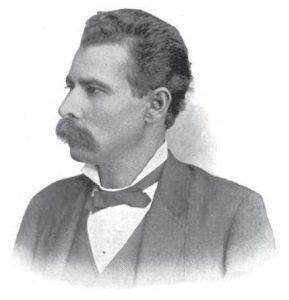
Norris Cuney
*Norris Cuney was born on this date in 1846. He was a Black politician, businessman, union leader, and activist in Texas.
Norris Wright Cuney was born near Hempstead, Texas, in the Brazos River valley. He was the fourth of eight children of Adeline Stuart, a mixed-race slave of (African, European, and Native) American ancestry. Their father was Adeline's white master, Confederate Colonel Philip Cuney, a wealthy farmer. All his mixed-race children were born into slavery. Philip Cuney was a politician and was elected as a state senator. Following the American Civil War, he became active in Galveston politics, serving as an alderman and a national Republican delegate.
Young Cuney was freed by his father and sent north to Pittsburgh, Pennsylvania, for his education. The war interrupted his plans to attend Oberlin College, but he continued to learn all his life. On July 5, 1871, Cuney married Adelina Dowdie, a local schoolteacher also mixed race, the daughter of a Mulatto enslaved mother and a white planter father. The couple had two children, Maud and Lloyd Garrison Cuney (the boy was named after abolitionist William Lloyd Garrison). The parents were both musical: Cuney played the violin, and Adelina was a soprano singer.
Cuney became active in Black fraternal organizations and was elected by Black Masons as the grand master of the Grand Lodge of Texas in 1875. His son Lloyd became an official in the Congregational Church. Maud studied in Boston at the New England Conservatory of Music. She settled there, writing a biography of her father, published in 1913, and becoming an accomplished pianist, musicologist, author, and community organizer in Massachusetts.
Norris Cuney was appointed as United States Collector of Customs in 1889 in Galveston, the highest-ranking appointed position of any Black in the late 19th-century South. He was a member of the Union League and helped attract Black voters to the Republican Party; in the 1890s, more than 100,000 Blacks were voting in Texas. Establishing his own dockers business, he helped unionize Black workers in Galveston, opening jobs for them on the docks. He substantially improved employment and educational opportunities for Blacks in the city. He eventually became chairman of the Texas Republican Party and a national committeeman. Cuney is regarded by many as the most important black leader in Texas in the 19th century and one of the most important in the United States. Norris Cuney died on March 3, 1898, and is buried in Galveston.